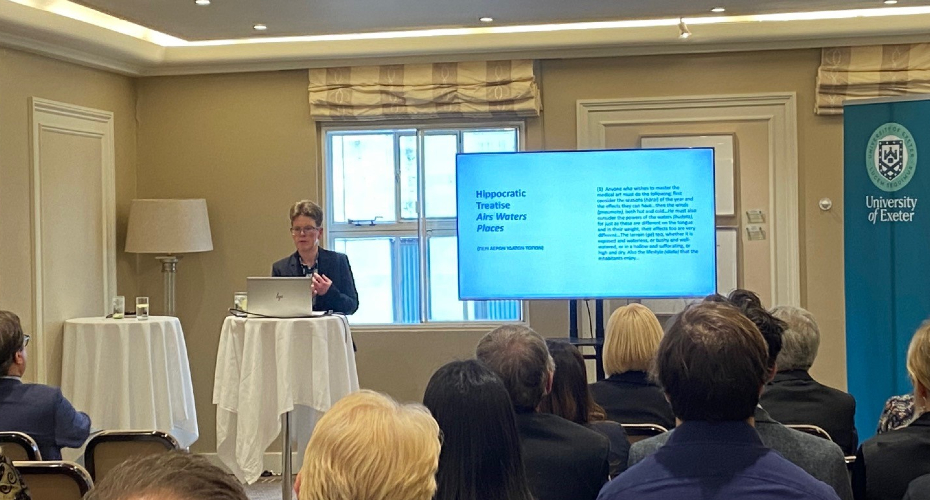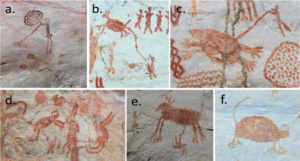University hosts inaugural Alumni Lecture for the A. G. Leventis Chair in Ancient Scientific and Technological Thought

Professor Rebecca Flemming addresses the audience
A UK-first academic position that brings together Ancient Greece, scientific and technological innovation and public engagement has been recognised with an inaugural Alumni Lecture in London.
Professor Rebecca Flemming, the first A. G. Leventis Chair in Ancient Scientific and Technological Thought at the University of Exeter, took to the stage to speak about the links between environment, disease and human health.
The event, held at the Lansdowne Club in Mayfair, is part of the 25th anniversary celebrations of the relationship between the University and the Leventis Foundation. It was introduced by Vice-Chancellor Professor Lisa Roberts and was attended by the Leventis family, trustees of the Foundation, alumni guests and University staff.
Professor Rebecca Langlands, Head of the Department of Classics, Ancient History, Religion and Theology – the Department in which the Chair sits – offered an introduction to Professor Flemming’s illustrious career and research interests before handing over for the main lecture, which was entitled ‘Health, Disease and the Environment in Ancient Greek Medicine’.
Professor Flemming spoke about how ancient Greek medicine viewed human health and disease as shaped by the environment – climate, terrain, winds and water – and how this view has contemporary resonance in the face of growing climate concern. She went on to present two case studies – the environmental impact on fertility; and the relation between human and animal disease – and later took questions from the audience.
She said: “It was a very enjoyable evening, with lots of great questions from an engaged audience and the opportunity for further discussions with alumni. These are topics that people are interested in and that really matter to them. The support of the Leventis family for this work is therefore invaluable.”
“The event was the perfect celebration of Classics and Ancient History’s 25-year warm relationship with the A. G. Leventis Foundation,” added Professor Langlands. “It was a splendid inaugural lecture from our newly funded Leventis chair, which really brought home the contemporary relevance of her research in ancient science, and a lovely chance to catch up with former students as well as members of the Leventis family.”
The A. G. Leventis Chair in Ancient Greek Scientific and Technological Thought was established in 2022 with a £1.2m donation from the Foundation. Through it, Professor Flemming will engage in teaching, research and outreach activities, communicating the importance of ancient science and technology to a broad and diverse audience.
Scientific and technological innovation were fundamental aspects of ancient Greek culture. Developments in philosophy and empirical research led to important innovations and wider intellectual interest in a range of fields including medicine, astronomy, zoology, botany, physics, ecology, mechanics, engineering and automation. There were major developments in scientific imagination, with a burgeoning interest in speculative thought about the universe and the beginnings of what we would now recognise as science fiction.
The University’s Department of Classics, Ancient History, Religion and Theology is internationally renowned for its work in the field, including through its Centre for Knowledge in Culture in Antiquity and Beyond. In the 2021 Research Excellence Framework, the University was rated 4th in the UK for 4-star rated Classics research.



